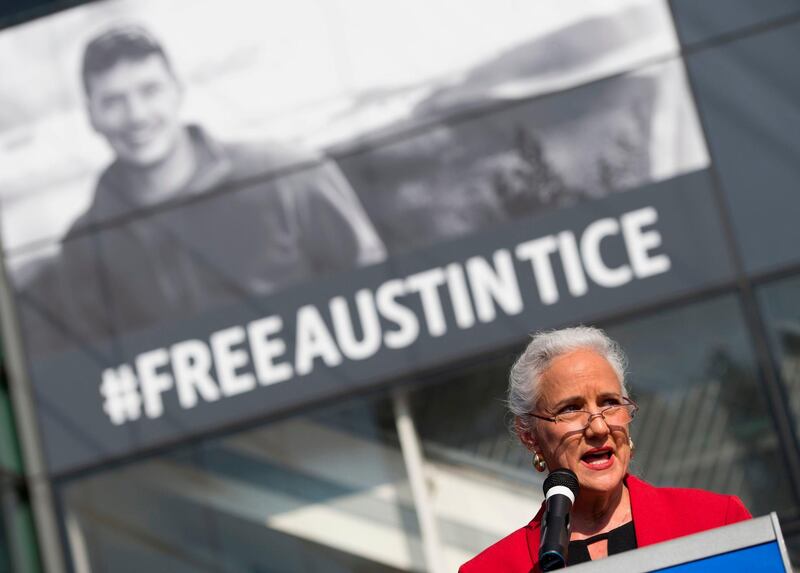Six years after American journalist Austin Tice went missing in Syria, his family along with the US administration believe that he is still alive, although little is known about his condition or location.
Mr Tice's family spent the anniversary of his disappearance on Tuesday publicising efforts to bring their son home, believing that keeping their son's case in the spotlight will ensure the US government stays focused on his release.
"It is time to see Austin walk free. It is time for him to come home," said his mother, Debra Tice.
The former marine and freelance reporter was a 31-year-old working for The Washington Post, McClatchy News, CBS and other news organisations when he was detained at a checkpoint near Damascus on August 14, 2012.
_______________
Read more:
Israel strikes military post in Syria's Hama province
Saudi's UN envoy says Hezbollah aims to destabilise the region
_______________
A month later he appeared in a video blindfolded and in the custody of an unknown group of armed men.
Since then there has been no official information on whether he is alive or dead.
“It seems like, in many ways, the time has gone so quickly, but we know that, for Austin, it must be grinding on,” Debra told NBC. When asked about what keeps them hopeful, his father, Marc Tice said, “well, we know he’s alive, and we’re sure he wants to come home”.
State Department spokeswoman Heather Nauert said on the sixth anniversary of his disappearance that the administration remains deeply concerned about his well-being and are actively working to bringing him home.
"We believe him to be alive," Ms Nauert said, adding that "we're doing everything that we can to try to bring him home".
Speaking to The Washington Post, his parents said they hoped the President Donald Trump's administration would open direct talks with the Syrian government to secure his release.
"We really do believe that this administration has a greater commitment to bring people home," his mother said.
The quest for his release is ongoing, every single international organisation that is working for press freedom has Austin Tice as their priority case, Ayman Mahanna, the director of the SKeyes Center for Media and Cultural Freedom in Lebanon, told The National.
“We are following the lead of Austin’s family, Marc and Debra Tice have been exceptional individuals who are dedicating their lives for Austin’s safe return with so much energy and faith,” Mr Mahanna said.
“If there is one reason to believe that he will come back safely it’s because of the passion of his family,” he said, adding that it’s time to have full transparency on Austin’s case.
“It’s time to end this painful chapter and let him go back home,” Mr Mahanna said.
Reporters Without Borders (RSF) are continuing to work closely in supporting the Tice family in every effort to bring Austin home, Margaux Ewen, RSF's North America director told The National.
"Continuing to raise awareness on Austin's case keeps him at the forefront of the ongoing efforts to secure his return home, and is crucial to ensure that his case, and his work as a journalist to document the crisis in Syria, are not forgotten by the American public or the international community," Ms Ewen said.
The Committee to Protect Journalists say that Syria remains one of the most dangerous countries in the world for reporters. In the first half of this year, 47 journalists worldwide were killed, while more than half of the 54 foreign reporters held hostage are in Syria.
Mr Mahanna said that although the international community is focusing on Austin's case, we must not forget the others.
"There are three journalist’s who are still missing in Syria, Samir Kassab who went missing in October 2014 with his colleague the Mauritian reporter Ishak Moctar of Sky News Arabia," he said. "Another is Palestinian journalist who was the bureau chief of Al Hurra in Istanbul, Bashar Fahmi Al Qaddumi".







